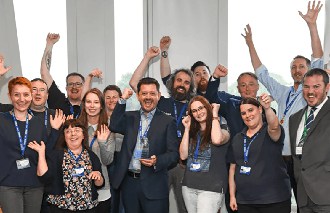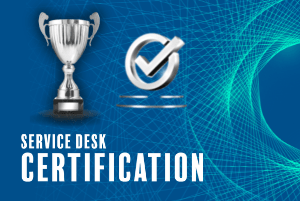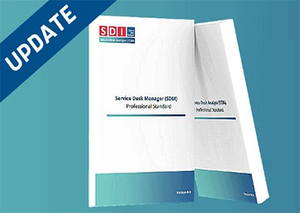
The battle for customer retention has reached an all-time high, prompting organisations to become intentionally belligerent with their tactics to attract and retain more customers. Due to that singular reason, service desk recruitment is taking on a whole new dimension.
Gone are the days when hard skills were the major prerequisite for determining the proficiency of an IT service desk agent. According to World Economic Forum research, emerging technologies such as generative AI are reshaping workforce demands, and employers are placing greater emphasis on “soft” skills.
Soft skills simply mean interpersonal skills, and they refer to those traits and qualities that allow individuals, in this case, customer service agents, to interact effectively and amicably with customers. In contrast to technical skills, which are applied to specific roles, soft skills are adaptable and valuable irrespective of the discipline.
In this blog, we’ll discuss how soft skills can enhance your service desk recruitment process and improve customer satisfaction and retention.
How to effectively assess a candidate’s soft skills
Here’s the tricky part! It’s easy to measure the technical skills of a candidate with hands-on real-time problems; however, without the right set of tools, you may have a hard time making accurate soft skill evaluations during the interview process.
Implementing the following ideas could help you get on track.
✅ Consider using pre-employment assessment platforms during the mentioned process. There are different tests available, ranging from mechanical reasoning tests to soft skill tests. These tools provide valuable insights into a candidate’s personal traits, management tactics, and ability to navigate the work environment and interact with others effectively.
✅ Pose logical thinking questions that require candidates to explain necessary soft skills that they consider relevant to their roles. This could give you a taste of their understanding of the service desk role.
✅ Have candidates align their non-technical skills from the strongest to the weakest. Although this may not be all that accurate as most people will base their answers on what they think you want. If candidates rank the required skills as part of their weakest – this is probably a red flag to your business.
✅ Finally, present candidates with problems that require soft skills. During the interview, cite a scenario that happened within your organisation and pay close attention to the candidate’s responses. This singular approach can reveal tip-offs about the best candidate for the job.
6 Reasons why soft skills are important in service desk recruitment
When handling the technical aspects of customer service like troubleshooting activities, hard skills come into play, but what about situations on emotional intelligence, problem-solving, or understanding of customer needs and pain points?
Soft skills take the front lines!
#1 Effective communication

Communication is vital! IT service desk agents serve as the single point of contact between an organization and its clientele, hence the need for strong communication skills. Communication isn’t termed effective from regular responses to customer queries and complaints but more so when it showcases elements of clarity, timeliness, empathy, and purpose.
Service desk professionals often interact with customers with different backgrounds and accents. Using clear and explicit words to communicate ideas, information, and instructions is the key to successful communication. It’s also important to take into consideration the context and relevance of the message within the current environment and state of activities.
Moreover, finding a sweet spot between empathy and emotional intelligence allows service desk professionals to prioritise customer emotions and adapt communication styles to foster trust and build close customer rapport.
#2 Problem-solving abilities

Thinking beyond the box! Customer service agents often face critical and complex scenarios. They often find themselves in the dilemma of having to make tough decisions that have direct impacts on customer satisfaction.
- Critical thinking and problem-solving skills, allow service desk agents to quickly discern the root of a problem and offer potential solutions.
- Creativity and resilience, allow service desk personnel to manage unexpected situations and provide almost instantaneous solutions without having to fret.
- Employing critical thinking can lead to better decisions that align with the customer’s current situation. By considering customer loyalty status, preferences, and urgencies, service desk agents can explore different workarounds and eventually come up with the best possible solution.
- High levels of composure and professional demeanor during agitated situations give customers the impression that their voice has been heard and that adequate support is on the way.
#3 Teamwork and collaboration

Together, Everyone Achieves More! Soft skills set the groundwork for seamless collaboration and facilitate learning opportunities, knowledge sharing, and brainstorming sessions to solve problems more efficiently.
Additionally, teamwork and collaboration give rise to the following:
- Synergy and combined expertise; working together as a team opens the door for diverse skills and expertise which allows members to leverage the strengths of others to generate innovative ideas.
- Learning and career development; working in a team that fosters a learning culture allows employees to expand their wits and develop new skills through collaboration.
- Increased productivity; teamwork facilitates the division of labor which is a game-changing strategy for any business looking to accomplish tasks and projects more efficiently.
#4 Time management
Could there be a more time-consuming role than that of a service desk professional? Handling multiple inquiries and requests from clients, co-workers, and other stakeholders at intervals is nerve-wracking. However, effective time management skills give room for;
- Improved efficiency: Proper time management skills let service desk agents classify their tasks as top priority while allotting due time to carry out their duties more efficiently. This, in turn, leads to increased productivity.
- Enhanced customer service experience: By making judicious use of time, service desk agents focus on customer needs. This means offering adequate and timely solutions that increase customer satisfaction and loyalty.
- Minimised risks of stress and burnout: Stress and burnout often occur due to cumbersome workloads. However, proper time management prevents service desk professionals from procrastinating and work accumulation, leading to a healthier work-life balance.
- Meeting SLAs and time limits: If something negatively impacts the customer service experience, it’s the failure of service desk agents to meet service level agreements and deadlines. Nonetheless, adequate time management can help to prevent breaches and improve efficiency.
#5 Technical explanations
Unravel the mystery! At times, unusual scenarios may occur that involve intricate technical concepts and require troubleshooting steps. While customers may have a hard time deciphering the technicality of these terms, service desk professionals are obliged to break down these details into simpler bits for easy comprehension.
Picture a scenario where you got caught up during the process of making a purchase or transaction without any clues on how to proceed with your activities. You tried reaching out to customer service support but couldn’t get something tangible out of your conversation.
Imagine how frustrating that can be! Non-technical skills, like listening skills, let service desk agents understand the technicality of a customer’s situation. Communication skills allow service desk personnel to break down seemingly humongous details into clear and simple terms.
These help customers adhere to instructions, carry out troubleshooting activities seamlessly, and get their issues resolved more efficiently.
#6 Adaptability and lifelong learning

Developing the growth mindset! The IT industry is growing at an unprecedented rate, and new technologies are coming into the limelight. So, IT customer service agents have to stay up to date with the latest industry trends.
But if soft skills like a growth mindset, adaptability, and willingness to learn are missing from the equation, keeping up with the latest trends might seem like a daunting task…
Continual learning leads to:
- Personal and professional growth; knowledge, and skill acquisition allow service desk professionals to stay relevant in the ever-dynamic global market.
- Innovation and creativity; continual learning gives room for new concepts, points of view, and ways of reasoning.
- Enhanced problem solving; engaging in lifelong learning exposes individuals to a host of problem-solving techniques that widens one’s scope of problem analysis, creative solutions, and data-driven decisions.
On the other hand, adaptability toughens up an individual and allows them to bounce back from failures while adapting their tactics to withstand changing circumstances.
Look beyond the technical prowess
The process of recruiting service desk agents is a very delicate phase. Oftentimes, a candidate’s resume may not necessarily be a true reflection of their competence. So, you have to be thorough in your analysis and pay attention to all the details.
To successfully hire the best talents, leverage the viability of technologies to assess candidates’ true potential and look beyond their technical capabilities.
Having strong hard skills is a crucial requirement for anyone aspiring to work as a service desk professional. However, candidates that showcase a mix of hard and soft skills are your best bet at delivering an exceptional customer service experience.

Rilwan Kazeem
Rilwan Kazeem is a freelance content writer, explorer, and reader. He has covered topics including digital marketing, HR, emerging technologies, and their intersection with business. Rilwan’s writing has been featured in Leaderonomics, Engagedly, and Newsbreak—where he unraveled “10 simple steps to launch an online business in 2023”, among others.



























